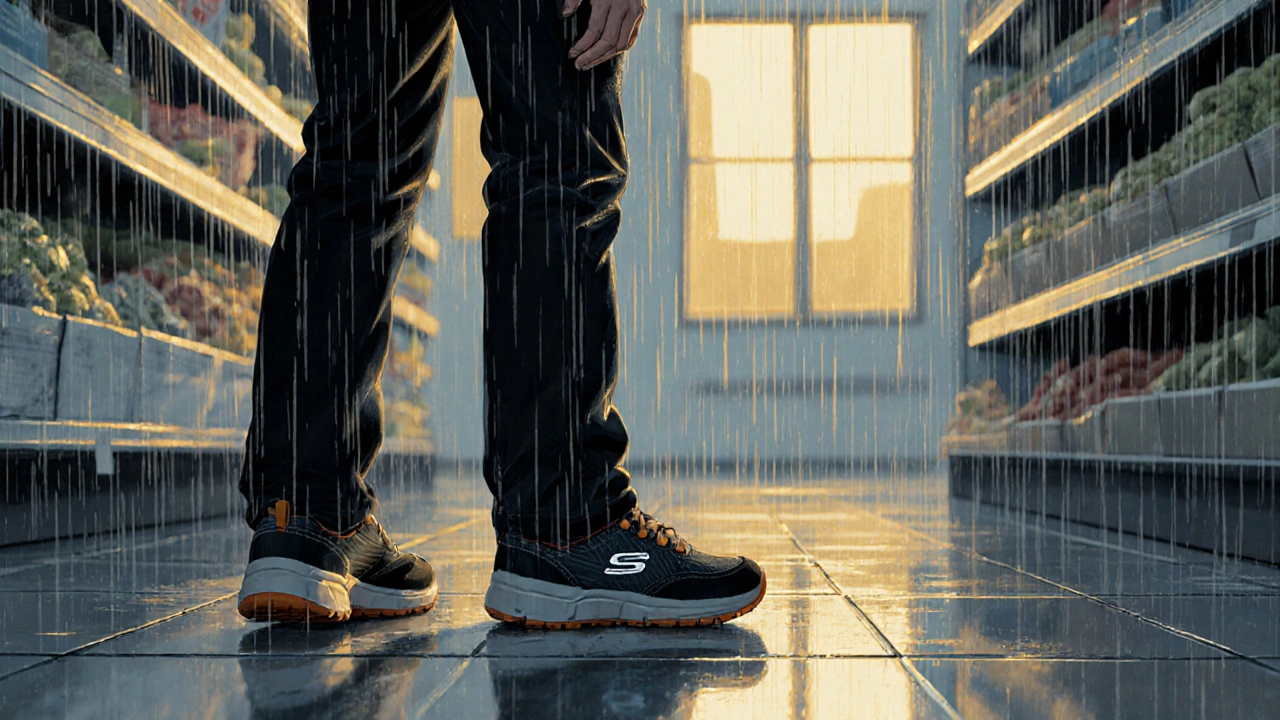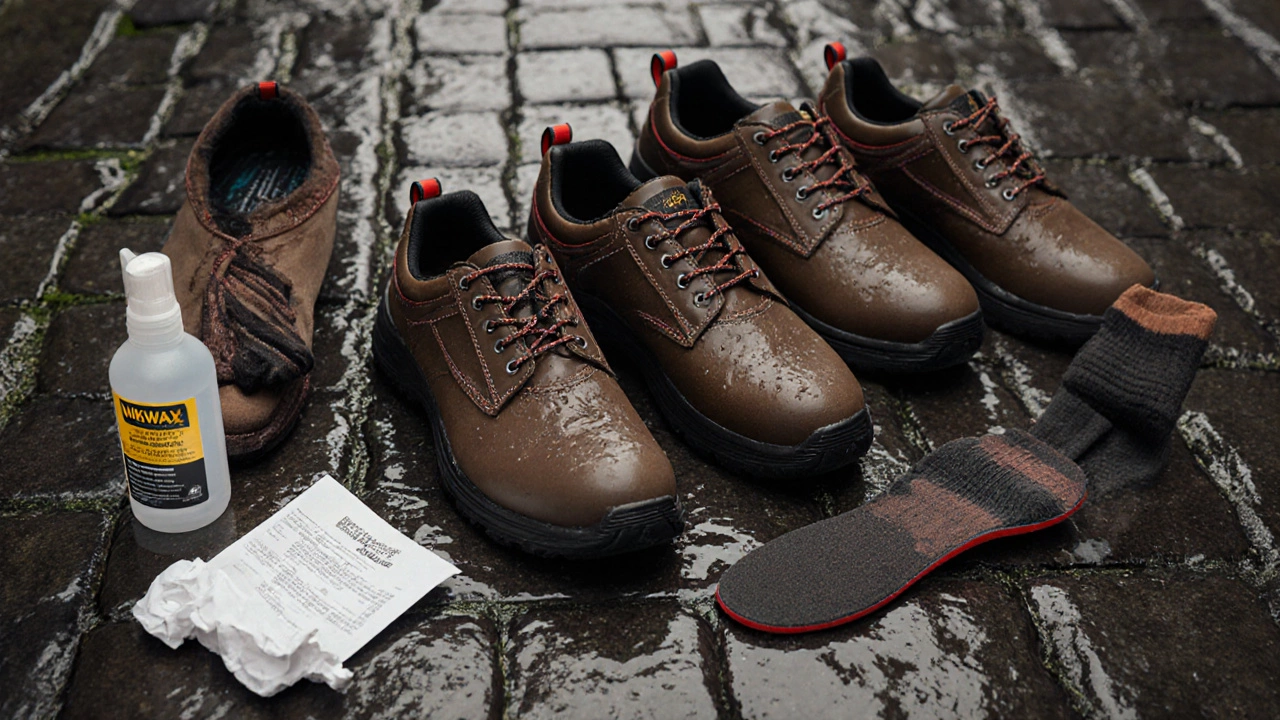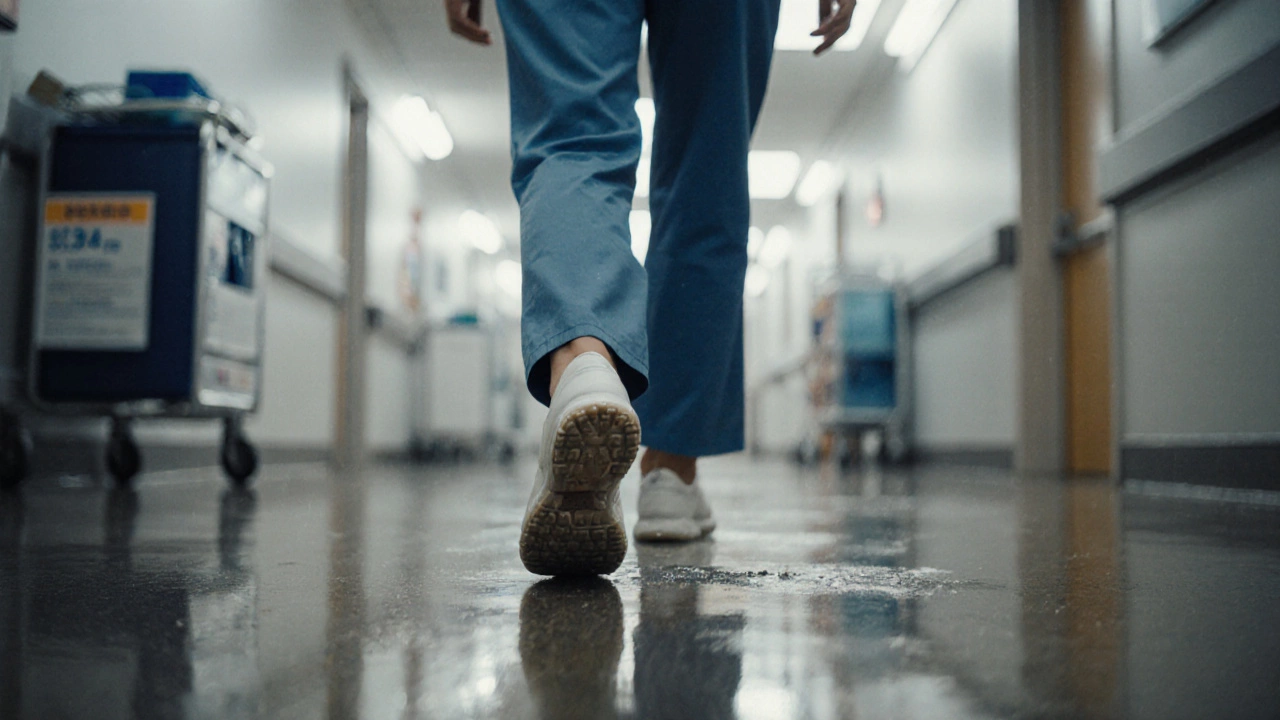In Ireland, where rain is a daily companion and concrete floors are the norm in hospitals, schools, and retail stores, the right pair of work shoes isn’t a luxury-it’s a necessity. Standing for eight hours on wet tile in Galway, walking endless corridors in Dublin’s hospitals, or pacing aisles in Cork’s supermarkets means your feet take a beating. That’s why podiatrists across the country don’t just suggest shoes-they prescribe them. And what they recommend isn’t about fashion. It’s about function, support, and survival.
Why Irish Work Environments Demand Special Shoes
Irish workplaces don’t operate on dry, climate-controlled floors like in some other countries. Think damp linoleum in Limerick clinics, uneven cobbles outside Belfast pharmacies, or steel-grated walkways in Shannon’s manufacturing plants. The ground doesn’t give. And neither should your feet.
According to data from the Irish Podiatry Association, over 68% of healthcare workers and retail staff in Ireland report chronic foot pain by age 40-mostly from inadequate footwear. The problem isn’t laziness. It’s that most people buy shoes based on looks, price, or what’s on sale at Dunnes Stores. Podiatrists see the fallout: plantar fasciitis, bunions, heel spurs, and nerve damage from shoes that lack arch support or cushioning.
What makes Irish conditions unique? The weather. Rain soaks through cheap soles. Cold seeps into thin uppers. And the dampness breeds fungal infections if shoes don’t breathe. So when a podiatrist in Cork, Louth, or Donegal recommends a shoe, they’re not just thinking about your arch-they’re thinking about your entire day, from the bus stop to the break room, in a country where winter lasts nine months.
The Top 5 Shoes Podiatrists Recommend in Ireland
After reviewing hundreds of patient cases and consulting with podiatrists from the HSE and private clinics, here are the five models most consistently recommended across Ireland:
- Clarks Unstructured - A staple in Irish workplaces for over a decade. The cushioned EVA midsole absorbs shock on concrete, and the breathable leather lets feet dry out after a rainy commute. Used by nurses at Tallaght University Hospital and cashiers at SuperValu in Waterford.
- Orthofeet Proven - Designed for people with flat feet or plantar fasciitis, this shoe has a removable orthotic insole and a wide toe box. Popular among teachers in rural primary schools where floors are old and unforgiving.
- Rockport Total Motion - Lightweight, flexible, and water-resistant. Often recommended for staff at Dublin Airport and bus drivers on the 145 route. The rubber outsole grips wet surfaces better than most brands.
- Skechers Work Sure Track - A go-to for warehouse workers in Limerick’s industrial parks. The slip-resistant sole meets Irish Health and Safety Executive standards for wet environments. And it’s priced under €80-rare for a medical-grade work shoe.
- Dr. Scholl’s Work Pro - Found in most GP waiting rooms across Mayo and Galway. The memory foam insole molds to your foot over time, and the heel cup stabilizes your gait on slippery floors.
These aren’t just brands. They’re solutions tailored to the Irish reality: damp, cold, and relentless.
What Podiatrists Warn You Against
Not all shoes sold as “comfortable” are safe. Podiatrists in Ireland see the same mistakes over and over:
- Flat ballet pumps - Sold everywhere from Zara to Penneys, these offer zero arch support. They’re fine for a quick trip to the post office, not for a 10-hour shift in a pharmacy.
- Leather-soled shoes - Popular in Dublin’s older professional circles, but leather soles are slippery on wet tiles. A recipe for falls, especially in winter.
- Second-hand work boots - Worn-out soles lose their grip. A boot bought off Facebook Marketplace might look fine, but the cushioning is compressed. Podiatrists say: if you can’t press your thumb into the insole and feel resistance, it’s dead.
- Shoes without a heel counter - That stiff back part of the shoe? It holds your heel in place. Without it, your foot rolls inward. That’s how you get shin splints.
One Galway podiatrist told a patient: “If your shoes look like they belong in a 1990s office movie, they’re probably hurting you.”

Where to Buy Podiatrist-Approved Shoes in Ireland
You won’t find these shoes in every mall. Here are the trusted spots across Ireland:
- FootSmart - With locations in Dublin, Cork, and Limerick, they have certified pedorthists on staff who assess your gait and recommend shoes based on your job and foot shape.
- Irish Footcare Clinics - Run by podiatrists, these clinics sell only approved brands. You can get a free foot scan at their Dublin or Galway branches.
- Workwear Ireland - A Belfast-based online retailer specializing in safety footwear that meets Irish and EU standards. They ship nationwide and offer returns if the shoes don’t relieve pain.
- Boots Pharmacy - Surprisingly, many Boots locations now carry Dr. Scholl’s and Skechers Work lines. Ask for the “foot health aisle” near the back.
Pro tip: Avoid buying work shoes online without trying them on. Foot size changes with age and swelling-especially in women after pregnancy or men who stand all day. A size 8 in one brand might be a 7.5 in another.
How to Make Your Shoes Last Longer in Irish Conditions
Even the best shoes wear out faster here. Here’s how to extend their life:
- Use a waterproofing spray every 6 weeks-especially on leather shoes. Nikwax is widely available in Irish outdoor stores like Cotswold Outdoor and Decathlon.
- Rotate two pairs. If you wear the same shoes every day, they don’t dry out fully. Swap them every other day.
- Replace insoles every 6 months. The original ones compress. You can buy replacement orthotics from FootSmart for under €25.
- Get your soles resoled. Many local cobblers in Cork, Limerick, and Dundalk offer this service for €30-€50. It’s cheaper than buying new shoes.
One nurse in Kerry told her podiatrist she’d been wearing the same pair for three years. The soles were worn thin, and the arch support had collapsed. She got new ones. Within two weeks, her morning heel pain vanished.

What to Do If Your Feet Still Hurt
Shoes alone won’t fix everything. If you’re still in pain after switching to podiatrist-approved footwear, here’s what to do next:
- Book a free foot assessment with your local HSE podiatry service. Wait times vary, but in Dublin, it’s usually under 6 weeks.
- Ask for custom orthotics. These aren’t just insoles-they’re molded to your foot. Covered by some private health plans like VHI or Laya.
- Try physiotherapy. Many Irish physios specialize in foot and ankle rehab. Ask your GP for a referral.
- Join a walking group. Low-impact movement helps. The Dublin Walking Network and Galway Walking Club both offer free weekly walks on soft trails.
Don’t wait until you can’t walk to the bus stop. Early intervention is the biggest predictor of long-term foot health in Ireland.
Final Advice: Don’t Just Buy Shoes-Invest in Your Body
Podiatrists in Ireland don’t sell shoes. They save careers. Nurses, teachers, retail workers, and cleaners-these are the people who keep Ireland running. And their feet are their foundation.
Buying a €150 pair of podiatrist-recommended shoes isn’t expensive. It’s cheaper than a month of painkillers, a missed shift, or a doctor’s visit you could’ve avoided. It’s also cheaper than replacing worn-out soles every 3 months because you bought the wrong pair.
Look at it this way: if you stand 8 hours a day, 5 days a week, that’s 2,000 hours a year. Your feet deserve better than what’s on sale at the corner store. They deserve shoes built for the Irish ground, the Irish rain, and the Irish grind.
Do podiatrists recommend sneakers for work in Ireland?
Yes-but only if they’re designed for work, not sport. Regular running sneakers lack the heel support and slip resistance needed for wet floors. Podiatrists recommend work-specific sneakers like Skechers Work Sure Track or Rockport Total Motion. Avoid Nike or Adidas training shoes for long shifts.
Are expensive shoes worth it for Irish work environments?
If you stand for more than 6 hours a day, yes. A €120 shoe that lasts 2 years costs less per day than a €50 pair that wears out in 4 months. Plus, poor footwear leads to medical bills, missed work, and chronic pain. The upfront cost pays for itself.
Can I use orthotics with any shoe?
Not always. Shoes need enough depth and a removable insole to fit custom orthotics. Brands like Clarks, Orthofeet, and Dr. Scholl’s are designed for this. Avoid tight, shallow shoes like ballet flats or loafers-they won’t fit.
What’s the best shoe for standing all day in a hospital in Ireland?
The Clarks Unstructured is the top choice among Irish hospital staff. It’s breathable, cushioned, and has a non-slip sole that works on wet linoleum. Many nurses at Beaumont or Cork University Hospital wear them daily.
Do Irish podiatrists recommend waterproof shoes?
Absolutely. With Ireland’s frequent rain and damp floors, waterproofing is non-negotiable. Look for shoes with breathable waterproof membranes (like Gore-Tex) or treated leather. Avoid non-waterproof mesh shoes-they trap moisture and cause fungal infections.
